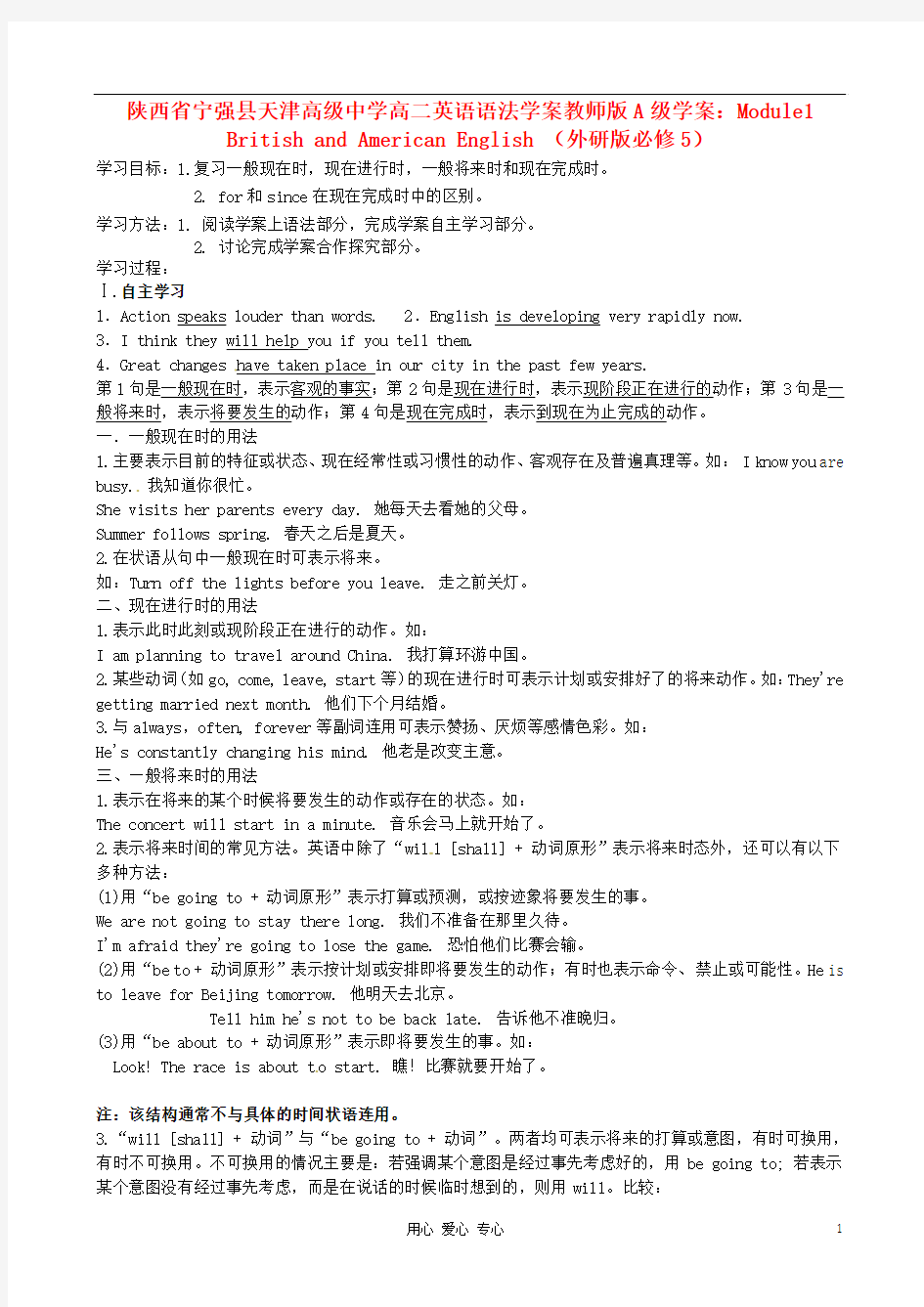Module1 British and American English语法A级学案(教师版)外研版必修5


陕西省宁强县天津高级中学高二英语语法学案教师版A级学案:Module1 British and American English (外研版必修5)
学习目标:1.复习一般现在时,现在进行时,一般将来时和现在完成时。
2. for和since在现在完成时中的区别。
学习方法:1. 阅读学案上语法部分,完成学案自主学习部分。
2. 讨论完成学案合作探究部分。
学习过程:
Ⅰ.自主学习
1.Action speaks louder than words. 2.English is developing very rapidly now.
3.I think they will help you if you tell them.
4.Great changes have taken place in our city in the past few years.
第1句是一般现在时,表示客观的事实;第2句是现在进行时,表示现阶段正在进行的动作;第3句是一般将来时,表示将要发生的动作;第4句是现在完成时,表示到现在为止完成的动作。
一.一般现在时的用法
1.主要表示目前的特征或状态、现在经常性或习惯性的动作、客观存在及普遍真理等。如: I know you are busy.我知道你很忙。
She visits her parents every day. 她每天去看她的父母。
Summer follows spring. 春天之后是夏天。
2.在状语从句中一般现在时可表示将来。
如:Turn off the lights before you leave. 走之前关灯。
二、现在进行时的用法
1.表示此时此刻或现阶段正在进行的动作。如:
I am planning to travel around China. 我打算环游中国。
2.某些动词(如go, come, leave, start等)的现在进行时可表示计划或安排好了的将来动作。如:They're getting married next month. 他们下个月结婚。
3.与always,often, forever等副词连用可表示赞扬、厌烦等感情色彩。如:
He's constantly changing his mind. 他老是改变主意。
三、—般将来时的用法
1.表示在将来的某个时候将要发生的动作或存在的状态。如:
The concert will start in a minute. 音乐会马上就开始了。
2.表示将来时间的常见方法。英语中除了“wil l [shall] + 动词原形”表示将来时态外,还可以有以下多种方法:
(1)用“be going to + 动词原形”表示打算或预测,或按迹象将要发生的事。
We are not going to stay there long. 我们不准备在那里久待。
I'm afraid they're going to lose the game. 恐怕他们比赛会输。
(2)用“be to + 动词原形”表示按计划或安排即将要发生的动作;有时也表示命令、禁止或可能性。He is to leave for Beijing tomorrow. 他明天去北京。
Tell him he's not to be back late. 告诉他不准晚归。
(3)用“be about to + 动词原形”表示即将要发生的事。如:
Look! The race is about t o start. 瞧!比赛就要开始了。
注:该结构通常不与具体的时间状语连用。
3.“wi ll [shall] + 动词”与“be going to + 动词”。两者均可表示将来的打算或意图,有时可换用,有时不可换用。不可换用的情况主要是:若强调某个意图是经过事先考虑好的,用be going to; 若表示某个意图没有经过事先考虑,而是在说话的时候临时想到的,则用will。比较:
"Mary is in hospital. " "Oh, really? I didn't know. I'll go and visit her. " “玛丽住院了” “啊,真的吗?我还不知道。我要去看看她。”(临时想法,不能用be going to)
"Mary is in hospital. " "Yes, I know. I'm going to visit her tomorrow. " “玛丽住院了。” “是的,我知道。我打算明天去看看她。”(事先考虑好的意图,不能用will)
另外,若有迹象表明要发生某事,用be going to,而不用will。如:
Look at those black clouds. It's going to rain. 看那些乌云。要下雨了。
四、现在完成时的用法
1.表示过去发生的动作对现在所造成的影响或表示从过去某一时刻开始一直延续到现在的动作或状态。
如:
Have you considered going abroad to study? 你有没有考虑过出国留学?
The storm has lasted for three hours. 暴雨已经持续下了3个小时了。
2.经常与现在完成时连用的状语或结构有already, just, so far, in the last [past] few years, it is
the first time that…, for five years, since 1980等。如:
I've known her for a long time. 我认识她很长时间了。
I've already poste d your letters. 我已把你的信寄出去了。
So far there has been no bad news. 到现在为止还没有坏消息。
Since then, he has developed another bad habit.自那以后,他养成了另一个坏习惯。
Ⅱ合作探究:
1. Maya has been a professional since 1989.
2. So far, it has rained for five hours.
3. Joe has been a student here since March.
4. I haven't been to the cinema for ages.
5. Mary has kept a diary since she was ten years old.
观察以上句子,for和 since的区别为:
for 是介词,(词性)而since可作介词或连接词;for 后面跟表示时间段的结构
since后面跟表示时间点的结构。(点∕段)
Ⅲ课堂检测 (C级)
Ⅰ.用动词的适当形式填空.
1.I’m sorry I________(lose)my key.I can’t open the door.
2.It is said that the two planets________(move)closer and closer,and that’s the reason why so many earthquakes occur.
3.We always ________ (care)for each other and________(help)each other.
4.—What about your company?
—Jobs________(lose)if it closes.
5.This is the first time that I________(see)this kind of film.
答案:1.have lost 2.are moving 3.care;help
4.will be lost 5.have seen
Ⅱ.单项填空(BDACD ACADC BBCAA CAAAA)
1.We ________on our project day and night in the past two weeks.
A.had worked B.have worked C.will be working D.are working
2.—Ann is in hospital.
—Oh,really?I ________ know. I________ go and visit her.
A.di dn’t;am going to B.don’t;would C.don’t;will D.didn’t;will
3.I used to drink a lot of tea but these d ays I ________ coffee.
A.prefer B.preferred C.have preferred D.am preferring
4.Progress____so far very good and we are sure that the work will be finished on time. A.was
B.had been C.has been D.will be
5.—Have you got any job offers? —No.I________.
A.waited B.had been waiting C.have waited D.am waiting
6.Mr.Blake____Shanghai in a few days.Do you know when the earliest plane____on Sunday? A.is
leaving;takes off B.leaves;takes off
C.is leaving;is taking off D.leaves;is taking off
7.—Have you handed in your schoolwork yet?
—Yes,I have. I guess it ________ now.
A.has graded B.is graded C.is being graded D.is grading
8.I’l l come to call on you the moment I ________ my work.
A.finish B.will finish C.had finished D.will have finished
9.—How can I apply for an online course?
—Just fill out this form and we ________ what we can do for you.
A.see B.are seeing C.have seen D.will see
10.Because the shop ________,all the T-shirts are sold at half prices.
A.has closed down
B.closed down
C.is closing down
D.had closed down
11. —How long ____your new computer? —3 months.
A.have you bought
B.have you had
C.had you bought
D.had you had
12. -That ten pound note belongs to me.
A. Yes, it belongs
B. No, it doesn't
C. Yes, it is
D. No, it isn't
13. She will go if it ___ tomorrow.
A. isn't rain
B. don't rain
C. doesn't rain
D. didn't rain
14. I will not help you with your English if I ___ time tomorrow.
A. don't have
B. will not have
C. am not
D. won't
15. Next month my father ___ to China from America.
A. returns
B. are returning
C. are going to return
D. would return
16.I have no idea what ___ while I was asleep.
A. has happened
B. was happened
C. happened
D. had happened
17. Could you tell me when____?
A. he is coming
B. he was coming
C. will he come
D. is he coming
18. We ___ for Shanghai tonight.
A. are starting
B. have started
C. started
D. start
19.They___ last year, that is, they___for one year.
A.got married; have been married
B.married; have got married
C. have been married; married
D. have got married; married
20. The next time you ___ his parents, tell them I want to see them as soon as possible.
A. meet
B. will meet
C. are going to meet
D. met
